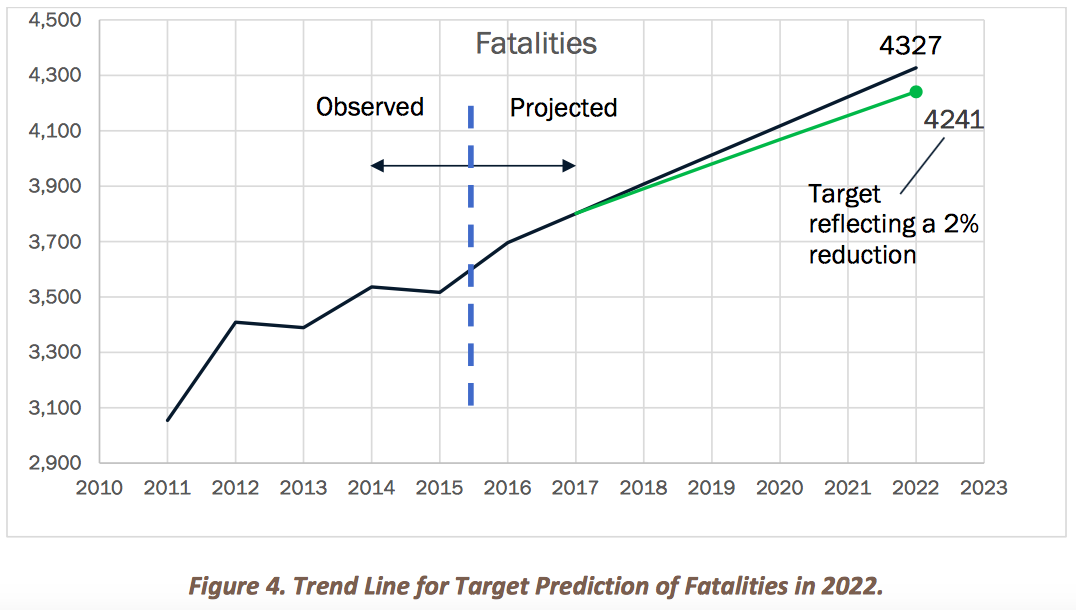It's no longer acceptable for American transportation agencies to ignore their responsibility to reduce traffic fatalities. Even a titan of the transportation establishment like the Federal Highway Administration has released a document called Toward Zero Deaths, with the cooperation of state DOTS.
But while agencies may feel compelled to pay lip service to traffic death prevention, they don't feel compelled to act on it. Case in point: Texas DOT.
TxDOT has set a long-term goal, in writing, of achieving zero deaths. But the agency's basic philosophy hasn't changed. It's still planning for more traffic and more asphalt, and as a result, its forecasts still expect a growing number of people to lose their lives in traffic crashes.
In its Strategic Highway Plan, TxDOT says it "envisions a future with zero traffic fatalities and serious injuries," and goes on to list what it calls "countermeasures" to improve safety. These include speeding reduction, safer intersection design, and pedestrian safety -- ideas that largely came from meetings between TxDOT officials and advocates.
But in its actual forecasts, TxDOT is still planning for steady growth in traffic mileage, and it doesn't expect the countermeasures to offset that. TxDOT's target for 2022 is 4,241 traffic fatalities statewide -- an increase of about 460 deaths compared to 2016.
The agency considers that to be progress because it's 2 percent below the projected number of traffic fatalities in a scenario with no "countermeasures." Why not attack the problem more aggressively, so traffic deaths actually fall over time? That's too ambitious for TxDOT, which says it will "avoid countermeasures not feasible due to the inability to enact specific laws and policies, resource requirements, lack of expertise or sponsors, and unlikely public acceptance."
Jay Crossley, executive director of the nonprofit Farm&City, says TxDOT isn't as helpless as it makes itself out to be. The agency could demonstrate some leadership and change the public conversation about how to make the transportation system safer.
"If you had a full-on cell phone ban, we know you could save lives," he said. "But they’re not talking about it because they don’t think it’s possible politically in Texas."
In the TxDOT forecast, the agency depicts itself as a passive bystander, watching as low gas prices and a humming economy propel traffic mileage higher, and with it, traffic deaths. Crossley says TxDOT has abdicated its responsibility by refusing to consider how it can reduce vehicle miles traveled, or VMT.
"The big one is VMT, this idea that VMT and economic growth are linked," he said. "They think it’s important to increase VMT."
"If that’s basically state policy, it’s hard to reduce deaths."
There's a long list of policy tools TxDOT could deploy to shift trips away from driving, like implementing variable tolling on Interstates or investing more in transit service and biking and walking infrastructure. That's not on the agency's agenda, however.
TxDOT sets the tone for the rest of the state. The regional agencies that guide transportation policy in Texas's major metro areas are following suit. On Monday, Austin's Capital Area Metropolitan Planning Organization (CAMPO) is preparing to affirm the same weak safety goal as TxDOT, over the protests of advocates.
Crossley thinks the agencies are setting a low bar for themselves because, in their way of thinking, it guarantees success. It's up to advocates to point out why that's the wrong approach.
"People are not willing to risk the consequences of not meeting the goals," he said. "To flip that on its head, that’s the whole point."






